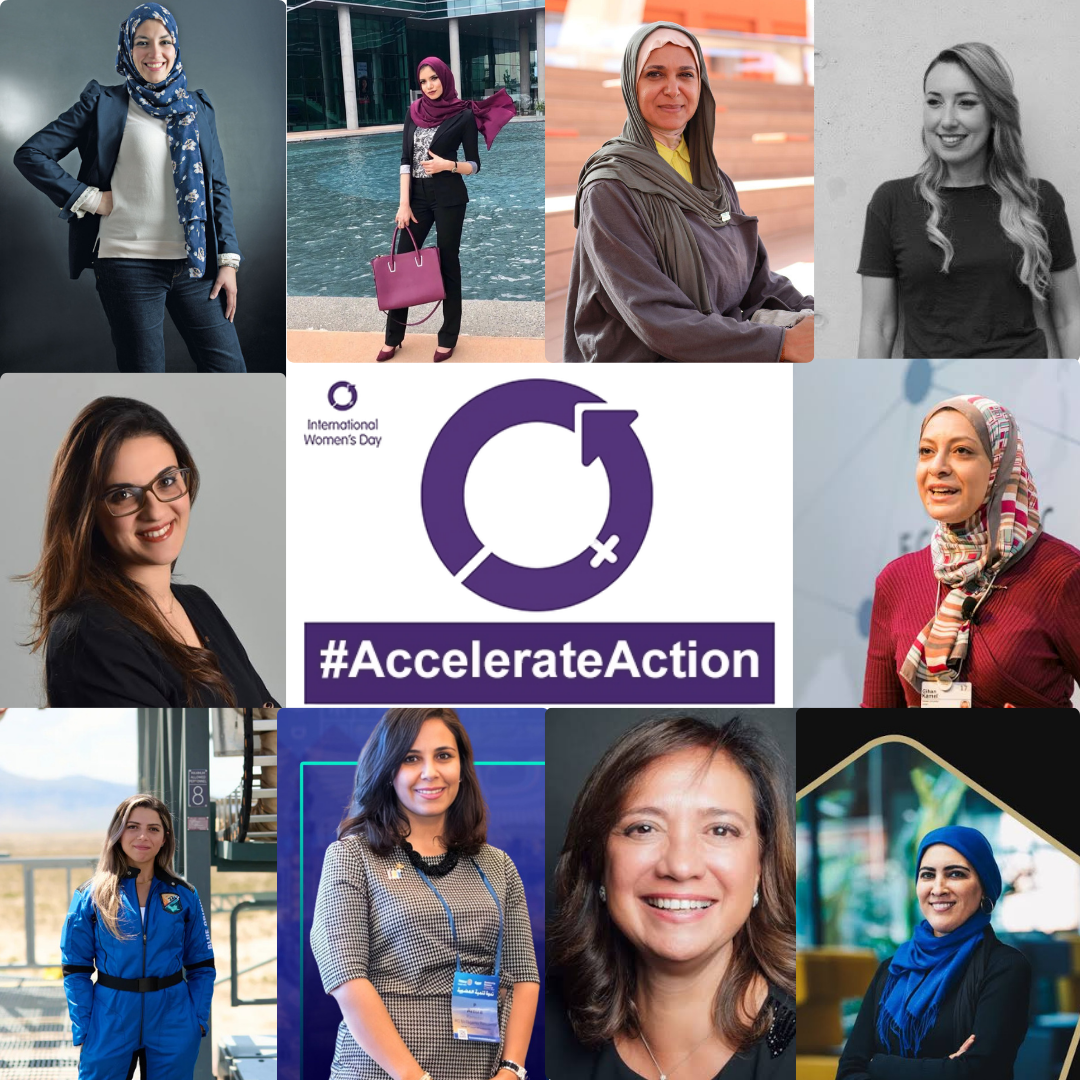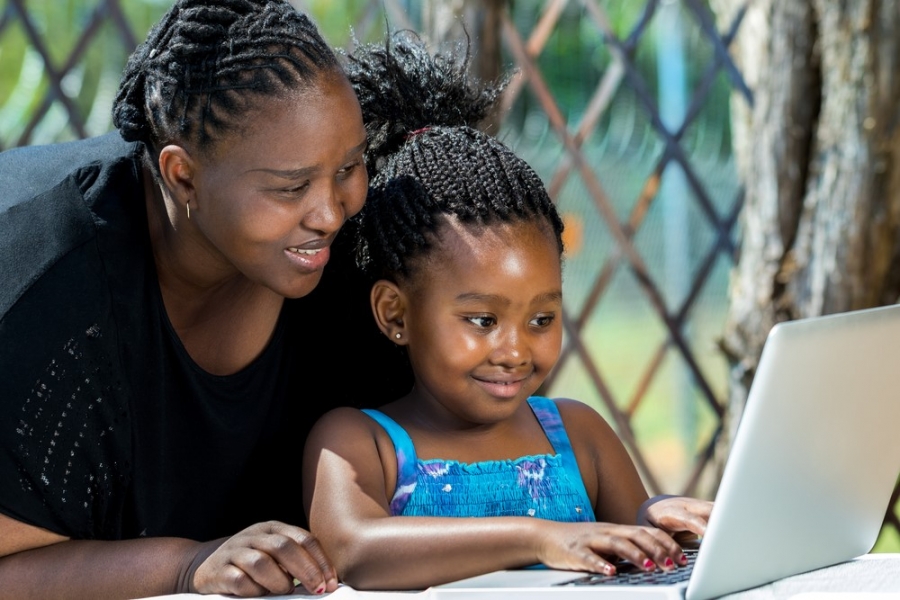As the world celebrates International Women’s Day (IWD) in 2025, themed “Accelerate Action,” the spotlight is on the urgent need for gender equality in all sectors, particularly in technology.
In Morocco and Egypt, women are not just participating in the tech revolution—they are leading it. From space exploration to innovative startups, these women are breaking down barriers, defying stereotypes, and reshaping the future of the industry.
With the rise of initiatives like the Women in Tech Egypt and TechWomen, these trailblazers are building supportive networks, championing diversity, and creating opportunities for the next generation of female tech leaders.
Techpression compiled a list of 10 extraordinary women from Morocco and Egypt who are driving change and breaking the silicon ceiling, one innovative step at a time.
Read also: Zimbabwean SMEs, women to receive €20 million financial support
Amira Ramadan (Egypt)
Amira Ramadan is a trailblazer in Egypt’s tech scene. She is known for her work empowering women through the Women in Tech Egypt chapter. She is on a bold mission to champion inclusivity and diversity in Egypt’s tech ecosystem, inspiring the next generation to break barriers and contribute to building a thriving, sustainable economy powered by Technology and innovation.
Also, Amira Ramadan is a dynamic Communication and Electronics Engineer with 15 years of experience in the IT and cybersecurity industry, bringing a wealth of expertise and a relentless drive for innovation.
Currently thriving as an Account Executive for Egypt and the Levant at Cloudflare, she combines strategic vision with a deep passion for empowering others.
The World Bank recognised her in 2015 for driving an innovative entrepreneurial initiative in sustainable agriculture. She has demonstrated a commitment to creating solutions that drive economic growth and sustainability.
“We need more women in tech to drive innovation,” she asserts. Amira’s dedication has earned her the Sales Excellence Award and Emerging SKO Award at SOPHOS.
Amira’s efforts are creating a more inclusive tech ecosystem, encouraging women to take on leadership roles in the industry.
Yasmine ElMehairy of SuperMama (Egypt)
Yasmine ElMehairy’s journey began at Ain Shams University, where she studied computer science. She bagged a coveted post at IBM. After earning a U.K. master’s degree on scholarship, she joined a regional IT behemoth at home.
Her passion for Technology and parenting led her to co-found SuperMama, Egypt’s first online platform for mothers.
“In Egypt, I would say that most parents look up to their kids working in a big multinational company,” she says. “So I broke the stereotype and said, ‘You know what? I’ve had it, I want to do something useful, and I want to do something on my own.’”
As it happens, doing something alone can be the case.
El-Mehairy is acutely aware of Egypt’s lack of an ecosystem for entrepreneurs, which has compelled her to seek resources and advisers to advance her business.
Today, SuperMama serves millions of users monthly, becoming a trusted resource for families across Egypt. Yasmine’s work has empowered countless mothers, providing them the tools and knowledge to navigate parenthood confidently. She won first place at the NexGen IT Competition and ArabNet Cairo up Demo Competition.
Sara Sabry (Egypt)
Sara Sabry, the first Egyptian and Arab woman to travel to space, has always been driven by her love for exploration. “Space is for everyone,” she emphasises.
She founded Deep Space Initiative, a Colorado-based nonprofit that aims to increase access to the space industry for people of all backgrounds by providing opportunities for research and education. Her journey from mechanical engineering to space exploration is a testament to her determination.
In an interview with CNN in 2024, she was asked, “What have you accomplished so far in your company?”
Sabry said, “Deep Space Initiative has been running several research programs, and it’s exciting to see the quality of work that comes from these groups that would not have otherwise had the opportunity to work on this”.
“They’re incredibly intelligent, incredibly qualified people to be conducting this research, but you can see how all they needed was this opportunity. All they needed was for someone to believe in them. I hope that this initiative provides this belief to a lot more people around the world”.
Sara’s achievements inspire young girls to dream big and pursue careers in STEM, proving that no field is out of reach.
Dina Ayman (Egypt)
Dina Ayman, a software engineering program manager at Microsoft in 2022, is a vocal advocate for diversity in tech and an adjunct professor at the New Jersey Institute of Technology.
Dina Ayman received a bachelor’s (2017) and master’s (2018) degree from the New Jersey Institute of Technology. She then worked at Intel and for the city of Austin, Texas.
In an interview in 2012, Ayman stated, “I love being in a male-dominated field, and it’s always motivated me. I’m driven by the obstacles and challenges I face in life. The more difficult I find it, the more determined I am to rise.”
In terms of learning, I’m always looking at how to improve my skills and what responsibilities I should add. I’m a big believer in Albert Einstein’s quote, “Intellectual growth
should commence at birth and cease only at death.”
Ayman works to encourage and empower women in engineering and is associated with the Haya Karima project, which reduces poverty and provides jobs in villages in Egypt.
In 2022, she became the first woman with a hijab to compete for Miss Universe and was named to Forbes’ 30 under 30 list. Through her advocacy and leadership, Dina breaks down barriers for Muslim women in tech and beyond.
Gihan Kamel (Egypt)
Gihan Kamel is a lecturer in Biophysics at Helwan University. Since the mid-2000s, she has been interested in the SESAME project, which brings together nine countries (Bahrain, Cyprus, Egypt, Jordan, Pakistan, Turkey, Palestine, Iran, and Israel). She is currently the only female scientist on the project.
In 2015, she earned recognition for her presentation at a TED conference on “Breaking the Rules”.
In 2023, she was one of six women that Nature chose to comment on their plans for International Women’s Day. The others were Sandra Diaz, Martina Anto-Ocrah, Jess Wade, Aster Gebrekirstos, and Tanya Monro.
In 2025, Gihan received the John Wheatley Award with Simon Connell and Sekazi Mtingwa.
Her work at SESAME has been instrumental in promoting regional collaboration. Gihan’s contributions inspire a new generation of women scientists in the region.
Kenza Lahlou (Morocco)
Kenza Lahlou, co-founder of Outlierz Ventures, champions African tech startups. “Africa has immense potential,” she says. She is a pioneer ecosystem builder and VC investor in Africa with a background in Technology and investment. With experience in software engineering, management consulting, and private equity, she has worked in Africa, Europe, Asia, and the US.
After earning a Master’s in Business in Singapore, Kenza worked in private equity in Africa after starting as a computer scientist in France.
Before founding Outlierz Ventures, she joined an advising firm in Silicon Valley that helped emerging market IT startups enter the US market.
Inspired by this experience, she returned to Morocco and co-founded StartupYourLife, one of the pioneer ecosystem builders in the country, as a leading community of tech founders to connect to investors and mentors in the region.
Nezha Larhrissi (Morocco)
Nezha Larhrissi, a Moroccan entrepreneur and co-founder of DabaDoc, has significantly contributed to healthcare access in North Africa, with an education background in computer science from ENSIAS, Morocco.
DabaDoc, established in 2014, is a digital platform that simplifies finding and booking medical appointments, thus bridging gaps in healthcare accessibility. The platform has garnered widespread recognition and has become a critical tool in enhancing patient-doctor connections across the region.
“As part of the grant, we are working on a digital app which will provide 50,000 Moroccan girls with advice, support and effective orientation,” Nezha explained.
In addition to her work with DabaDoc, Nezha co-founded eSTEM Morocco, a nonprofit that empowers girls in STEM fields. Since its inception in 2013, eSTEM Morocco has trained over 950 girls and engaged more than 300 mentors.
The organization has received accolades, such as the Global Citizen Award from the United Nations Association, for its contributions to gender equality in education.
Nezha’s initiatives have advanced technology-driven solutions and fostered community resilience, as seen during Morocco’s earthquake relief efforts through innovative tools like SeismeHUB.
Hind El Aoufi (Morocco)
Hind El Aoufi, a telecommunications expert, founded a startup focused on IoT solutions for smart cities. She believes that Technology can transform lives.
With a Master’s in Telecommunications from Télécom ParisTech. She founded a tech startup focusing on IoT solutions for smart cities. Also, she has achievements as a pioneering IoT application in Morocco’s urban Development.
Hind was awarded Recipient of the Moroccan Young Entrepreneur Award (2023). Her innovative approach is helping Morocco build more intelligent, more sustainable urban environments.
Hind’s work is driving technological advancements that improve the quality of life for Moroccan citizens.
Read also: Women in Leadership: Sylvia Mulinge steers MTN Uganda to historic UGX 641 billion profit in 2024
Laila Mamou (Morocco)
Laila Mamou is a prominent Moroccan business leader advocating diversity and entrepreneurship. She began her career in 1990 at Wafasalaf, a subsidiary of Crédit Agricole Personal Finance & Mobility, where she held key roles such as Head of Management Control, Risk Control, and Business Development. In 2004, she became the Chairwoman of Wafasalaf’s Executive Board.
Later, she served as Head of Subsidiaries and Holdings at Crédit Agricole Personal Finance before being appointed Deputy CEO of Sofinco in charge of Development in 2018.
Mamou is also profoundly engaged in societal initiatives. She founded the Entrepreneurs Network and serves as Secretary General of the EFE association Education For Employment.”
Her efforts to promote diversity include her membership in the “Club of Women Administrators”. Mamou was recognized for her influence and ranked 42nd on Forbes’ list of the most influential Arab women. She holds advanced degrees in finance and public management from French universities.
Fatima-Zahra Biaz (Morocco)
Fatima-Zahra Biaz is a pivotal figure in Morocco’s startup landscape. She founded New Work Lab in Casablanca, a crucial accelerator nurturing local entrepreneurs. Her dedication extends to empowering women in tech through co-founding Girls In Tech Morocco.
Biaz has crafted numerous programs that have aided countless startups, solidifying her impact. Her contributions have garnered recognition, including the Karim Jazouani Prize and the Tizi Espoir Entrepreneuriat et Innovation Award.
She’s also served as a jury member for prestigious events like the MIT Global Startup Workshop and the Morocco Web Awards, demonstrating her expertise and influence in the entrepreneurial sphere.
As these women continue to pave the way, their stories serve as inspiration for others. The journey to breaking the silicon ceiling is ongoing, but with initiatives like Women in Tech Egypt and TechWomen, the path is becoming clearer for women in Morocco and Egypt to achieve success in the tech industry.


